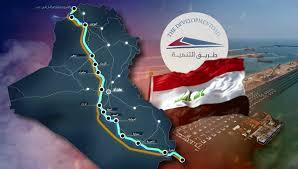KTFA
FRANK26: "AND THE MESSAGE SAYS... NO MORE PROGRAM RATE, NO MORE RESTRICTIONS!!!".....F26
"Our Country's Dream"... Al-Sudani Sends an "Important" Message to Gulf States Regarding the Path to Development
9/17/2024
Prime Minister Mohammed Shia al-Sudani stressed that the drop in oil prices to less than $72 confirms the need to diversify the Iraqi economy, while he addressed a message to the Gulf countries regarding the path to development.
Al-Sudani said during a televised interview followed by "Al-Eqtisad News", "The federal administration's budget allows it to pay $8 for every barrel of oil produced, while contracts signed with the Kurdistan Regional Government give companies $26. This stagnation has affected production from the region and led to a delay in the resumption of the pipeline."
Baghdad has been unable to agree on how much to pay international oil companies operating in the north of the country for their production.
"We have to look at how we balance these issues. Do we look at the budget to see what we can do or do we try to look at prices?" he added.
“Closing the pipeline, which can carry nearly half a million barrels per day of oil from Kurdistan to the Turkish coast, would cost billions of dollars in lost revenue. However, restarting it would pose a dilemma for Iraq, which has failed to comply with OPEC+ production limits amid dire financial needs but has repeatedly said it will compensate for overproduction,” he said.
Al-Sudani said, "We are committed to abiding by OPEC decisions and maintaining the oil price in a way that achieves a balance between the interests of users and producers."
Pipeline problems
Turkey halted the pipeline in March last year after an arbitration court ordered it to pay Iraq $1.5 billion in compensation for transporting oil through it without Baghdad’s consent. Ankara, which claimed the pipeline was shut for repairs after two massive earthquakes in February, said in October it was ready for operations and that it was up to Iraq to resume flows.
But financial and legal issues have emerged, such as compensating companies for costs. International companies have said they also want to settle their overdue receivables — including $1 billion for oil produced between September 2022 and March 2023.
With exports halted, companies have begun producing some crude and selling it domestically. Iraqi officials have previously said this production has caused problems with compliance with quotas set by the Organization of the Petroleum Exporting Countries.
Iraq’s production cap is set at 4 million barrels a day, but it produced 4.32 million barrels a day last month, according to data compiled by Bloomberg. The country, along with some other OPEC+ members, will gradually lift those limits starting in December.
Al-Sudani is keen to “increase production in the long term after years of war and internal conflict that have affected Iraq’s oil industry. In August, BP signed a preliminary agreement to help boost production from the Kirkuk region. Iraq is also rehabilitating and modernizing damaged refineries to help reduce fuel imports.”
The Prime Minister continued, "Because of the wars and the blockade over the past four decades, Iraq has been late in exploiting the wealth we have of gas and oil properly. Now we are looking at how to exploit the new wealth we have and how to use it effectively."
Diversify the economy
But he said, "The drop in oil prices in London to around $72 a barrel - near their lowest levels since 2021 - underscores the need to diversify the economy."
Iraq is OPEC's largest oil producer after Saudi Arabia and derives the bulk of its revenues from exporting the commodity, and needs much higher prices to balance its budget.
The IMF has long said the country needs to develop its private sector, and that economic progress is being hampered by a huge public sector wage bill, with successive governments not doing enough to curb high wage increases.
Al-Sudani pointed out that "his administration is looking to invest about 40% of Iraq's oil revenues to boost the non-oil sector," adding that "the planned trade corridor extending from Basra Governorate in southern Iraq to Turkey and then to Europe was a 'dream' for his country, and he is looking to the Gulf states to help finance the project, which is supposed to cost $17 billion."
